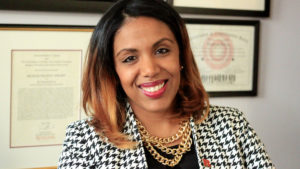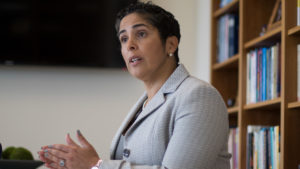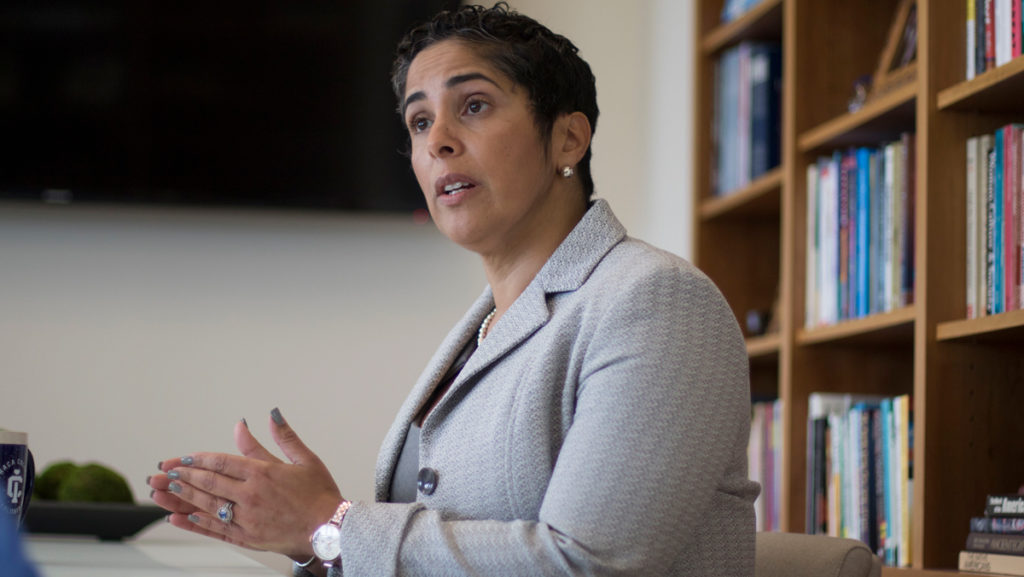*This post was updated at 4:30 p.m. to incorporate comments from President Shirley M. Collado, incoming Vice President Rosanna Ferro and campus sources.
Ithaca College President Shirley M. Collado announced Sept. 21 the creation of the Division of Student Affairs and Campus Life and the appointment of a vice president to head that division. In addition, she added two new counselors at the Center for Counseling and Psychological Services and a caseworker in student affairs, among other positions.
Rosanna Ferro, one of the current associate deans at Williams College, was directly appointed by Collado without a formal search, which is typically conducted by a search committee. Ferro will officially begin her role Oct. 30. She will lead the Division of Student Affairs and Campus Life.
Prior to joining Williams in 2013, Ferro held various positions at Rutgers University–New Brunswick, including serving as assistant director of the Office of Multicultural Engagement and assistant director of learning communities. Collado came to the college from Rutgers University–Newark, although the two did not work together there.

Ferro and Collado met three years ago when Collado was leaving Middlebury College and Ferro was at Williams.
“I was encouraged … to connect with President Collado, we had a lot of similar interests and a similar philosophy around student life,” Ferro said. “From afar I remember thinking ‘wow it would be really cool to once be able to come together.’”
Ferro said she is looking forward to focusing on the student experience through the newly-dedicated division.
“From afar the obvious thing that stands out to me is the fact is that there hasn’t been a standalone student affairs division, and so there hasn’t been kind of this intentional focus on the work,” Ferro said. “Now there will be someone at the senior level focusing on vision and goals and long term planning and really making sure that the work that Ithaca is doing matches the expectation that students have.”
Ferro acknowledged that, given the college’s past, there will be challenges to address in terms of student satisfaction.
“Right now there has been a lack of vision at the senior leadership level because it was kind of impossible for one person at the provost level to take all of this on,” Ferro said. “I think that now going in it’s really about reassuring students that their experience outside the classroom is just as important as inside, and having a healthy campus life is integral to having a student be happy.”
Ferro will be on campus Oct. 3 to engage with the campus community.
The Division of Student Affairs will be independent of the provost’s office, and the provost will continue to serve as a chief academic officer and will lead the Division of Academic Affairs, according to the announcement. Provost Linda Petrosino is slated to remain in that role until the end of the academic year. Collado said she is moving forward with a search for a “newly defined provost role and portfolio.”
Carlie McClinsey, president of Student Governance Council, said this is a change the college has needed for a long time.
“The real reason they were combined was to create more collaboration between those two departments, but I think it ended up overwhelming that department and hurting both student affairs and academics on campus,” McClinsey said.
Tom Swensen, professor and chair in the Department of Exercise and Sports Sciences, and chair of Faculty Council, said he is excited for a person with such a wide skillset to come into this position.
In addition, Collado announced that she will be adding one case manager in student life and two counselors in CAPS. These are areas where campus constituencies have demanded action in the past. Collado said in her announcement that the demand for counseling has increased both nationwide and at the college, and that the college must offer student support to be “truly student-centered.”
Collado also created the position of executive director of government and community relations, which will manage key initiatives shared between the president’s office and the offices of the college’s vice presidents and campus leaders. The search to fill this position will begin soon, according to the announcement.
In addition, Melissa Daly, a former senior executive assistant in the chancellor’s office at Rutgers University–Newark who worked with Collado previously, will now take over as chief of staff in the president’s office. Daly will officially begin in her role Nov. 6. Amanda Lippincott, who previously held that position, resigned Sept. 19.
Minnie Lauzon, Collado’s administrative assistant, has been promoted to assistant to the president. She previously served as an administrative assistant. Lauzon will be responsible for coordinating presidential events and acclimating Collado to her role as president. The hiring process to fill the administrative assistant position is in the final stages.
Collado also announced that Nancy Pringle will remain at the college as executive vice president and general counsel and secretary to the Board of Trustees, for another two years, through June 2019.
History of student affairs at the college
This is the first time since 2012 that student affairs will be a division independent of the Office of the Provost and Vice President for Educational Affairs. In 2012, the college integrated what was then known as the Division of Student Affairs and Campus Life with the Division of Academic Affairs. At the time, former President Tom Rochon said the move was intended to foster a more collaborative environment within the college’s administration.
That structural reorganization effectively combined the Division of Student Affairs and Campus Life with the Division of Academic Affairs under one roof as the Office of the Provost and Vice President for Education Affairs and eliminated the position of vice president of student affairs.
Student Affairs and Campus Life, the Center for Academic Advancement, Office of Intercollegiate Athletics, the Center of Civic Engagement, the Center for Faculty Excellence, the Integrative Core Curriculum, the Office of International Programs and Extended Studies, the Ithaca College Library and the Office of the Registrar were housed under this umbrella of “educational affairs.”
In a 2015 open letter, faculty criticized the merger, saying the move reduced access to administration by consolidating the divisions and all they encompassed.
At the time of the merger in 2012, The Ithacan reported that the student life divisions at Elon University, Simmons College and Clarkson University all had systems where student affairs were housed under their provosts.
However, today, many colleges in Ithaca College’s common data set peer group (those similar in size and type) still have separate divisions between academics and student life. For example, Hofstra University’s academic affairs fall under the Office of the Provost, while the Division of Student Affairs stands alone, operated by their vice president of student affairs. Similarly, at Emerson College, the provost and chief academic officer is separate from the the vice president and dean of campus life.
Collado said she made the decision to separate student affairs and academic affairs based on conversations she has had with those in the college community and the results from the campus climate survey. Both sources expressed that there was more focused support needed for students, she said. The campus climate survey, which was released in April, found that 31 percent of students said they seriously considered leaving the college. The top reason students reported for feeling this way was because they lacked a sense of belonging.
Anna Gardner, vice president of campus affairs for SGC, said the division will benefit students, faculty and staff on the campus more effectively than the previous concentration of duties in the provost’s office.
“To break up academic and campus is going to be really strong and those provosts can better support each area.”
Past criticism
Collado’s decision to create a new position without a formal search is a type of decision-making style that has been criticized in the past. A lack of transparency and collaborative decision-making was a source of criticism in Fall 2015 when students, faculty and staff voted “no confidence” in Rochon’s leadership, which led to his ultimate resignation. Critics also disapproved of Rochon’s top-down administrative hires without open, collaborative searches.
Another point of concern was new administrators being added as staff lines were being cut, and few new resources were added to other campus services, like Counseling and Psychological Services.
In an open letter submitted to The Ithacan in November 2015, more than 100 faculty members said, “We strongly oppose the recent decision by President Tom Rochon to create a ‘Chief Diversity Officer’ position at Ithaca College. … Our objection is to the authoritarian top-down process used to create the position. … We insist that future plans … be drafted and initiated in collaborative consultation.”
In the college’s recent history, all high-level positions have been chosen through an open search process where candidates would come to campus and meet the community so that constituency groups could give their input on their preferred candidate. However, Collado’s own presidential search became closed in December 2016 to protect the identity of candidates, since many feared that publicly participating in a search at another college could negatively affect their current careers. Collado mirrored these concerns about the vice president position for the Division of Student Affairs and Campus Life. She said she did not want to risk losing Ferro, who she said has been heavily recruited from other institutions and has the right qualities for the job.
“I hope I’m introducing what it means to be thoughtful and purposeful as a leader, but also decisive,” Collado said.
Swensen said not all decisions need a search, especially in this case when Collado was able to identify someone that he believed would be appropriate for the role.
“I think we will trust our president on this,” he said.
Robert Sullivan, associate professor in the Department of Communications Studies, said he is not bothered by the fact that there was no formal search. He said Ithaca could not afford to wait around for a process that could take a long time.
“The fact that the president reached out to hire someone with whom she has confidence, to me, is a good thing,” he said. “My hope that it will jumpstart the very, very pressing need that we have to get this college moving again.”
Collado said the other interim positions that are currently in limbo at the college may also have to become closed searches because of the same concerns that surrounded her own presidential search. These positions include the provost and vice president for Educational Affairs as well as the chief diversity officer and vice president of finance and administration. She said she wants to keep them open, but she does not yet know what the college will have to do.
Asma Barlas, professor in the Department of Politics, said she is happy that a vice president of student affairs and campus life has been reinstated, since she was critical of Rochon’s decision to concentrate so much into the Provost’s office. However, she said that although she was happy, she is a faculty member that believes in appointments being filled through a search.

Collado and Student Affairs
At the All-College Gathering in August, Collado said she would be focusing on enhancing student affairs and campus life — which received a strong stream of applause from the audience — and strengthening her presidential team.
She also mentioned this goal at a meeting with the Faculty Council in September. Collado said she had been working to re-evaluate the current provost position. She said she felt the current portfolio — all of the components under the provost’s office — was hard to oversee and said it needed to be innovated.
She said at the meeting that she was looking forward to hearing from faculty, staff and students about what they believe should be the duty of the provost.
Collado also has a background that is steeped in student affairs. In her position at Rutgers University–Newark, Collado oversaw academic and student affairs. Before Rutgers, Collado served as vice president for student affairs and dean of Middlebury College in Vermont.
“I want you to know that I am fully committed to making decisions that will both improve the student experience at Ithaca College and allow our leaders to best serve our entire campus community,” Collado said in the announcement. “I will keep our community updated, too, as we determine the best way to fill other administrative positions occupied by interim leaders.”
Future leadership changes
Collado would not say what the cost would be for adding the five new positions to the college. She said she is not done evolving her team, and that there may be more changes in leadership to come. Moving forward, she said, she will continue to maintain the financial sustainability of the college through her reconfiguration of her leadership team. However, she said she will not hyperfocus on keeping a tight budget and that she views these leadership additions as investments rather than costs for the college.
“I want to think about possibilities and answering very hard questions for us as a community together, and not make decisions based on just numbers or math,” Collado said.
Assistant News Editors Sierra Guardiola and Sophia Adamucci contributed reporting
CORRECTION: A previous version of this article stated that Collado had worked at Rutgers University–New Brunswick. It has been changed to state that she worked at Rutgers University–Newark.







